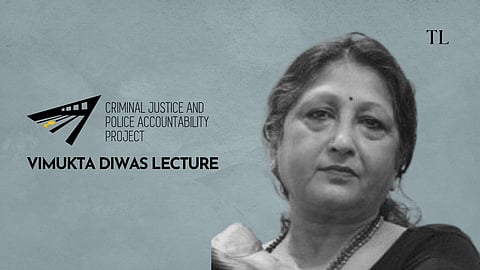

ON AUGUST 31 - VIMUKTA DIWAS, India completed 73 years since the repeal of the Criminal Tribes Act (‘CTA’) of 1871, a law which categorised numerous nomadic and semi nomadic tribes as 'born criminals'. Last Saturday, on September 6, we congregated virtually for an insightful lecture by Justice (Retd.) Anjana Prakash for the Vimukta Diwas lecture organised by the Criminal Justice and Police Accountability Project, a research and litigation collective based in Bhopal.
The CTA was repealed in 1952, in the years shortly following the Constitution’s enactment - there was no space for a law which, as Justice Prakash noted, was based on “Eastern European” sensibilities that criminality could be ‘genetic’ or ‘hereditary’. “Better days had come according to the Constitution,” she noted, “There would be equality, fairness etc etc, and as time went by the Article 21 was expanded.”
However, she noted that issues surrounding stereotyping on criminality has remained in our laws - through police manuals which remained more or less the same since 1861, providing wide discretionary and surveillance powers, and modern laws such as the Bharatiya Nagarik Surkaksha Sanhita which require evidence of ‘general repute’ for the execution of bonds. This ‘general repute’ is often based on the narrative presented before the Court by the police, and determines preventive detention.
Justice Prakash highlighted the significance of narrative building in how the communities continue to be criminalised. Highlighting the custodial death of Deva Pardhi last year, who belonged to a De-notified Tribe, she noted how several newspaper reports “celebrated the death…saying that he was a veteran criminal and [praising] that the police acted swiftly.” Justice Prakash referred to a recent report by CPA Project on everyday policing in Guna, Madhya Pradesh, to highlight that between 2019 - 24, 71.7 percent of arrested persons were from oppressed caste or tribal communities, and the total cases instituted against them was fifteen times their population share, a disproportionate number.
Justice Prakash also highlighted significant issues surrounding obtaining bail by accused persons from DNT communities. Referring to the CPA Project report, she noted that while 51 percent of the arrests were for bailable offenses, 40.6 percent were arrested for non-bailable offences.
With regards to bailable offences, even though the law is clear that the accused must be produced before the magistrate, and may be released on bail upon furnishing of bail bond, she noted that often the police acted as an “interested party…interested in putting [the] person behind the bars”, and courts, too, fail to act “judicially”. She also noted that despite repeated guidelines pointing out that accused persons in bailable offences unable to furnish bonds owing to monetary constraints can be released on personal bonds, the same has not been followed.
She noted that despite the Supreme Court’s decisions in Satender Kumar Antil (2022) and Arnesh Kumar (2014), the “ground realities” surrounding bail in non-bailable offences have not changed, and accused persons from DNT communities arrested under non-bailable offences under the Excise Act continue to languish. This, she assessed, was primarily due to prejudice playing a role in how discretionary powers have been used.
Justice Prakash also took note of the vulnerability of children from DNT communities who face barriers to access to education and face criminalisation. Referring to a report which showed that 40 percent of India’s child population lives in difficult circumstances, and that 12.6 million children were engaged in hazardous industries, Justice Prakash highlighted that education and rehabilitation was crucial to improve the situation. She pointed out that several children from marginalised communities lacked caste or tribe certificates or parental income certificates owing to which they have not been able to enjoy protection under the SC ST Act, or benefits of reservations. She suggested that these children may be declared ‘children of the state’, such that they could be treated on par with children who possess these certificates, and are “integrated into society.” She suggested that such children apart from being given vertical quota may also be given applicable horizontal quota.
Referring to the legal regime of the Juvenile Justice Act which applies to children in conflict with law, Justice Prakash highlighted that the goal of the Juvenile Justice Board was “not punishment, but understanding the child’s circumstances and charting a path to rehabilitation.” She referred to a Supreme Court decision concerning a child aged between 16 to 18 years who was alleged of murder. An initial assessment by the Special Investigation Report showed that the child understood the consequences of the act and should, thus, be tried as an adult. However, Justice Prakash praised the Court interpreting “consequences” in broader terms, as whether the accused understood not only the immediate consequence, but the suffering of the victim and their family. Justice Prakash also commended the Court noting that the time provided to the accused to rebut the findings of the psychologists was “inadequate” since the JJ Act prioritised the presumption of innocence, the right to equality and nondiscrimination, and ensured that child rights were not waivered.
Welcoming a recent decision of the Kerala High Court, where the High Court ordered for the deletion of juvenile records of an aggrieved person citing the principle of “fresh start”, Justice Prakash noted that it was essential that there is “absolutely no record of the child being previously implicated in a case, [so that they are not] stigmatised on account of that”.
Justice Prakash concluded by noting positively that the conversation on the rights of children, and the criminalisation faced by DNT communities was now being discussed more widely.
Full lecture here: https://www.youtube.com/live/9Ne7-YlJRlw?si=3KJrUh6avyRAY-ZS